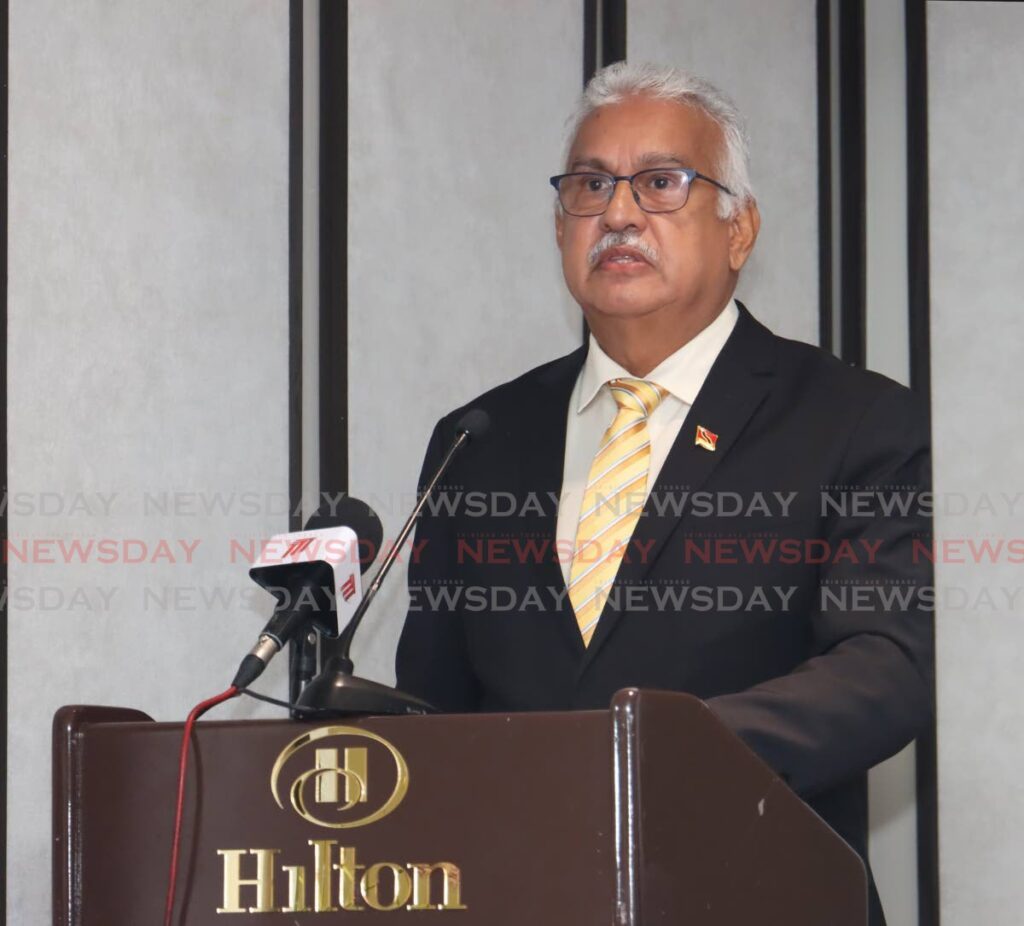Deyalsingh: $631m spent on CDAP, cancer treatment in 3 years

RESPONDING to recent reports suggesting the government plans to cut CDAP and that medication for cancer treatment was either antiquated or unavailable, Minister of Health Terrence Deyalsingh has said between CDAP assistance and cancer treatment, the government has spent more than $631 million over the past three years.
Deyalsingh was speaking at the non-communicable diseases primary care symposium at the Trinidad Hilton on Tuesday.
He told reporters the total cost of CDAP from 2021 to date was $190,326,466.31 and the cost of cancer treatment was $440,793,251.99.
The two figures totalled $631,119,718.30.
On CDAP, he said: “We give out free medication under the rubric of universal health coverage for a range of diseases. CDAP is a very expensive programme to administer, and we administer it to 87,050 active patients on the roll right now.”
He said for 2021 government spent $8.03 million on “non-pharmaceuticals” – things such as syringes for diabetics, and equipment.
In the same year, pharmaceuticals such as metformin, amlodipine and nifedipine amounted to more than $18 million. Administration of the medicine cost more than $22.2 million.
The total amount spent on CDAP for 2021 was $48,354,472.09, he said.
For 2022 the total cost of CDAP was $25,684,987.56. In 2023, the cost was $54,405,810.97 and for this year so far, the government has spent $34,881,195.69.
“Tell me, which country in the world has that type of programme?” Deyalsingh said.
The CDAP programme, which started in 2003, has 87,050 active patients on its roll. Patients receive free medication through a total of 231 pharmacies. Deyalsingh said from 2021 to now, the number of prescriptions filled through the programme is 2,459,312.
“That is what this country does for its citizens at no charge,” he said.
‘We added oncology medicines’
As for oncology, Deyalsingh said the government provides not only medication but also surgical services, radiation services and chemotherapy.
“We also provide hospital stay, which you can’t quantify.”
He said for 2021 the government spent $115.3 million on cancer medication. In 2022, it spent $123.2 million, and in 2023 it spent $109.4 million.
In contrast to reports saying the cancer drugs are either antiquated or not available, Deyalsingh said the government had introduced new oncology drugs to the national formulary.
These include bevacizumab, for cervical and colon cancer, trastuzumab for breast cancer and leuprolide acetate for prostate cancer.
Speaking to the media after his speech, Deyalsingh also highlighted nilotinib, pazopanib, cetuximab, adalimumab and other new cancer and leukaemia treatments that had been added to the formulary.
“When a drug is approved for TT, it is approved for use and sale in TT, whether it is the private sector or the public sector. So the private sector is free to prescribe the drug as they see fit.
"However, in the public sector, we go through a different process to determine what drugs get out to the public sector,” he explained.
“There are always moves to ‘encourage’ the Ministry of Health to put brand-new drugs that are approved for sale in the private sector onto the formulary for the public sector.
"It is not an automatic transition onto the public formulary for many reasons. In the issue of oncology, we are always more careful than for other categories of drugs in putting the new drugs onto the formulary.”
He also explained that newer, “fast-tracked” medications are not always considered, as they sometimes may not work.
“Fast-tracked cancer drugs often fail to benefit,” he said, reading from an article in a medical journal. “The bottom line: we hope the findings would encourage more doctors to discuss with patients the uncertainty surrounding cancer drugs approved on an accelerated basis...
“When people advocate for that, I have to question their motives. My motive is not commercial. It is getting the safest, most cost-effective drugs to my cancer patients.”
On costs connected with oncology, Deyalsingh said the government provides free radiation therapy to 600 cancer patients in the private sector, as well as in St James, where 31 patients a day are treated.
He said radiation therapy through the private sector alone costs $51,522 per person, totalling $30,912,000.
As far as medication is concerned, in 2021, the government spent $115,399,856.52. In 2022 it spent $123,204,166.20 and in 2023 $109,453,209.27.
When added to the cost of radiation therapy for the private sector, Deyalsingh said, the government spent $146,311,856.52 in 2021, $154,116,166.20 in 2022 and in 2023 it spent $140,365,209.27
'We don’t appreciate what we have'
Deyalsingh said when it comes to what the government does for citizens with regard to healthcare, it is often misunderstood and misinterpreted, which confuses people and demoralises medical practitioners.
He admonished those who demonised the healthcare system, saying many don’t appreciate that this country has, for the most part, free healthcare.
“The countries we say that, ‘Oh, why can’t we be like this country or that country?’ –in those countries if you don’t have insurance you die. We don’t appreciate what we have,” he said.
“An October 2023 report from the National Comprehensive Cancer Network (NCCN) in the US spoke about carboplatin (a chemotherapy drug) not being available. Do you know which country has it? TT has it.
“In the 'great' US, there is a cisplatin (cancer treatment drug) shortage, but no one asked for their minister of health to resign.
"Can you guess what country has cisplatin? We do.”
He said the statements on healthcare in TT showed a lack of appreciation.
He made a point of publicly thanking Anisa Seeboo, principal pharmacist at the ministry.
“(She) works with me every day to make sure that this country has a secure supply of drugs in the face of global shortages. We don’t appreciate that, but I appreciate you,” he said.


Comments
"Deyalsingh: $631m spent on CDAP, cancer treatment in 3 years"